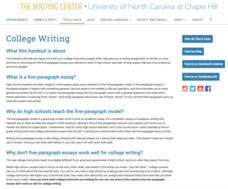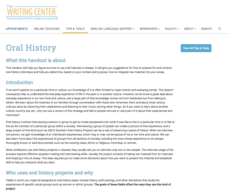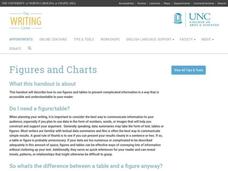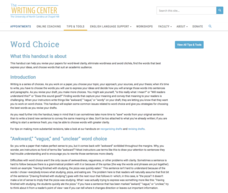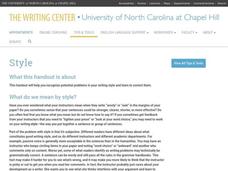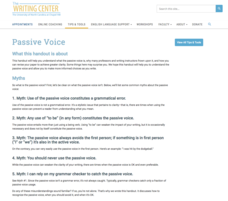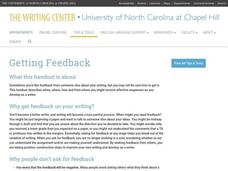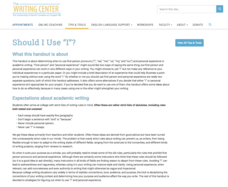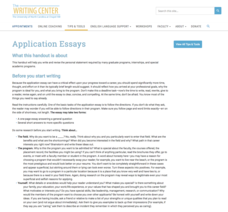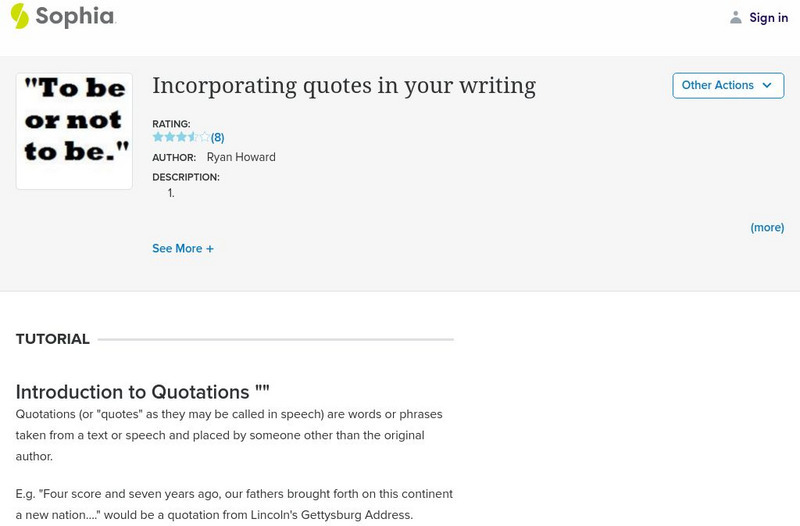University of North Carolina
College Writing
No matter how difficult high school writing may seem, college writing presents challenges of its own. The fourth in a series of 24 handouts from The Writing Center at UNC breaks down the expectations for college writing. Scholars learn...
University of North Carolina
Paragraph Development
There's no set length for a good paragraph, but the short block of text should contain key components. A handout on paragraphs, the 12th in a series of 24, outlines a five-step process for paragraph development. Additionally, the handout...
University of North Carolina
Abstracts
Some of the best information to include when writing a research paper doesn't come from books, magazine articles, or informational websites—it comes from dissertations. However, reading an entire dissertation is often a daunting task....
University of North Carolina
Oral History
There's no better way to learn something than to hear it straight from the horse's mouth. A handout on oral history, part of a larger series on specific writing assignments, explains how to conduct interviews and use the information...
University of North Carolina
Figures and Charts
Sometimes words aren't the best way to get information across to the reader. The eighth handout in the 24-part Writing the Paper series describes different type of figures and charts to display complex information in a paper....
University of North Carolina
Word Choice
Words matter, particularly in academic writing. Issues such as vague language, wordiness, and cliches make it difficult to get a point across. Part of a larger series to improve writing skills, the handout on word choice shows writers...
University of North Carolina
Evidence
You can claim that soda rots people's teeth or that dinosaurs were actually birds, but your claim will not stand up if it is not backed by evidence. A handout from UNC Writing Center, the seventh in the Writing the Paper series of 24,...
University of North Carolina
Style
Just like you choose your clothes to ensure they fit the occasion, you should choose your words deliberately while writing. Style, the main topic of one handout in a series on writing skills, involves choosing words carefully and paying...
University of North Carolina
Passive Voice
Why was the road crossed by the chicken? Because the writer forgot to write in active voice. Many myths surround the use of passive voice. Thankfully, an informative handout explains how to recognize passive voice and when it's okay to...
University of North Carolina
Getting Feedback
As many writers know, you are your own worst editor. The 10th installment in the Writing the Paper series explains that getting feedback from others is crucial to the writing process. The handout highlights the best time to ask others to...
University of North Carolina
Summary: Using it Wisely
Sometimes summarizing keeps a writer from going deeper into their analysis—don't fall into that trap. Learn the difference between summarizing and analyzing using an insightful resource. Focusing on introductions, the lesson shares...
University of North Carolina
Should I Use “I”?
Despite the formal nature of academic writing, personal pronouns frequently appear in high school and college papers. While your first instinct may be to cross them out, sometimes it's okay to use them, an idea covered in a handout that...
University of North Carolina
Application Essays
There's a lot riding on good writing! Often, an application essay is the difference between acceptance and rejection. As part of a series on specific writing assignments and contexts, a handout helps scholars craft the perfect personal...
University of North Carolina
Latin Terms and Abbreviations
N.B.. cit., n.b., viz., sc., inf. e,g,—these abbreviations frequently appear in academic papers and on works cited lists, but what do they mean? Part of a larger series to improve writing skills, the handout on Latin terms and...
Sophia Learning
Sophia: Topic Sentences: Map Your Way to Writing One
This tutorial on writing topic sentences includes 2 videos, 2 slide shows, and an audio clip. The first YouTube video explains the 4 parts of a topic sentence and tells where topic sentences belong. The 2 slide shows focus on the MAP...
ACT360 Media
Act Den: Writing Den
Need some extra help in spelling, grammar, and writing? Search no further. The writing den gives great tips for sentence structure and even on writing essays. A lot of great information for language arts students and teachers.
Sophia Learning
Sophia: Incorporating Quotes in Your Writing
Notes, a fourteen-slide presentation, and two videos teaching students how to incorporate and punctuate quotes into various sections of an essay and how to embed quotes within a paragraph.
Other
Introducing Plain Language
This site by Plain Language Online states that plain language "begins with the needs of the reader," which will determine why and how the writer writes. It goes on to elaborate on audience and purpose, idea organization, use of...
